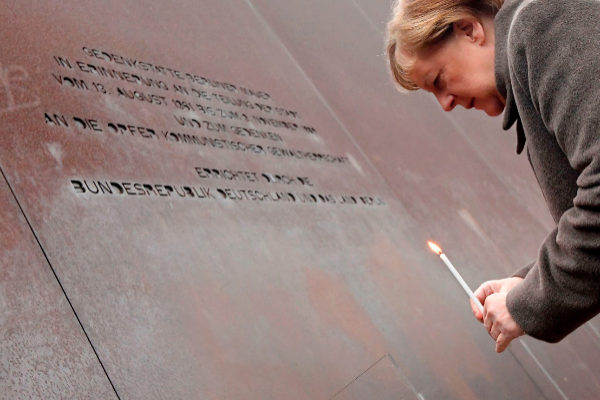- Berlin Wall Special Berlin's domino effect: from 'Polish October' and 'Prague Spring' to Hungarian 'Picnic'
- Special Berlin Wall: Three decades that have changed our world forever
German Chancellor Angela Merkel said on Saturday, the date that marks the thirtieth anniversary of the fall of the Berlin Wall, that "no wall is so high or so wide that it cannot be crossed" and reminded the dead of the dictatorship of the regime that raised it.
"Too many people were victims of the dictatorship of the SED" (German acronym for the Unified Socialist Party of Germany, the ruler in the extinct German Democratic Republic), Merkel said in an act in the German capital.
"We will not forget you. I remember the people who were killed next to this wall because they were seeking freedom. I remember the 75,000 people who were taken to prison for escaping from the republic," said the chancellor.
"November 9 is a fateful day in German history. Today we also remember the victims of the pogroms of November 1938," he added in reference to the attacks suffered by German Jews during the Nazi regime on that date of that year.
"On November 9, in which both tragic and happy moments are reflected in a special way, it reminds us that we have to decisively reject hatred, racism and anti-Semitism," he insisted. "The Berlin Wall is history and teaches us that no wall is so tall or so wide that it cannot be traversed," Merkel said hours before, before the Brandenburg Gate, festive events commemorating the fall are celebrated. of the wall that divided the city for 28 years.
Merkel deposited a rose in the place where the Wall was raised, accompanied by the presidents of Hungary, Poland, Czech Republic and Slovakia, countries that prepared for a long time for the fall of the wall and are often accused of not fully respecting the Rule of law rules.
Former allies, divided
This anniversary of the fall of the Wall is marked by a lack of general enthusiasm and divisions.
The celebration of ten years ago remains in memory, when leaders from around the world, including the four allied forces of World War II, gathered at the Gate of
Brandenburg in Berlin to tear down a false wall erected to commemorate the 20th anniversary of the end of the Iron Curtain.
The message at that time was clear: the walls and divisions are things of the past. Ten years later, the atmosphere is different.
The US Secretary of State, Mike Pompeo, left Germany on Friday night after two days of visiting and French President Emmanuel Macron will arrive in Berlin on Sunday night for a dinner with Chancellor Angela Merkel and German President Frank- Walter Steinmeier
Former Divided Allies
This week, the French president threw fire into the fire saying that NATO was in a state of "brain death" and regretting the lack of coordination between the United States, NATO partners and Turkey, a member of the Alliance, which recently launched a military offensive in northern Syria.
Merkel abandoned the diplomatic tone to which she has become accustomed to public opinion, saying that she did not share this "radical" vision and these "inopportune value judgments" of Macron.
To the divisions that are felt among the allies of the end of the Cold War is added a rarefied geopolitical environment.
In Berlin, Pompeo urged Western countries to "defend what was so hard conquered in 1989" and "become aware that there is a race to defend values against non-free nations," pointing to China and Russia.
The elected president of the European Commission, Ursula von der Leyen , also was not left behind when she asked that Beijing and Moscow be watched closely. The leader admitted that in 1989 there was a certain naivety, when the world believed together that the "victory of the liberal democracies could not stop."
From the point of view of internal politics, Germany does not show the enthusiasm that was breathed 30 years ago.
Merkel acknowledged that "it would take half a century or more" to de facto conclude a German reunification that seems to exist only on paper.
The political and economic fissures between the East and the West, richer, remain omnipresent and are felt, for example, by the advance in the East of the extreme right represented by the Alternative Formation by Germany (AfD).
"Nationalist and protectionist tendencies gain ground all over the world today," Merkel admitted Friday.
The anti-system discourse and contrary to the economic elites and the power of deep Cala in the East, where many people feel they are treated as second-class citizens.
According to the criteria of The Trust Project
Know more- Germany
- Angela Merkel
- Russia
- Poland
- WWII
- Ursula von der Leyen
- China
- European Comission
- Emmanuel Macron
CumbreEspaña says no to the budget; Sanchez rejects the amount and distribution and marks as "red line" agricultural aid
Germany The German city of Dresden declares the Nazi state of emergency
Conflict Emmanuel Macron and Angela Merkel urge Erdogan to stop the Turkish offensive against the Kurds in Syria

